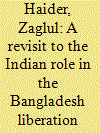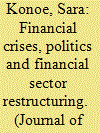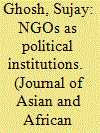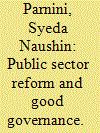| Srl | Item |
| 1 |
ID:
091957


|
|
|
|
|
| Publication |
2009.
|
| Summary/Abstract |
The Liberation War of Bangladesh was seen by the Indian policy makers as a prime time to dismember Pakistan. By the creation of Bangladesh, they pondered: (a) the political enemy on both its borders would be replaced by a far weaker enemy on one side and a friend on the other; (b) secularism would be regarded as a dominant ideology for the developing countries; (c) India would emerge as an Asian superpower; (d) India would establish a subservient government in Bangladesh; (e) Bangladesh would be an extension of the Indian market; (f) India would materialize the Nehruvian vision of the Greater Indian Union.
|
|
|
|
|
|
|
|
|
|
|
|
|
|
|
|
| 2 |
ID:
091955


|
|
|
|
|
| Publication |
2009.
|
| Summary/Abstract |
This article analyzes and compares the financial sector restructuring process after the financial crises in Japan and the United States. As these financial crises deepened, countries shifted their policies away from postponing financial sector restructuring toward more thorough reforms. The impacts of different political structures are examined through the Small-N Case Study method. Cases include: the bursting of the financial bubble in the 1990s in Japan and the Savings and Loan crisis in the 1980s in the USA, both of which are analyzed through a review of academic literature, journalistic writings, and statistical data from the World Wide Web.
|
|
|
|
|
|
|
|
|
|
|
|
|
|
|
|
| 3 |
ID:
091956


|
|
|
|
|
| Publication |
2009.
|
| Summary/Abstract |
The spread of the forces of globalization have significantly affected the modern world. Thus, in this article, I attempt to identify how globalization has negatively influenced development of tertiary or higher educational policies in underdeveloped countries. Using the case study of India, I observe that the liberalization of the Indian economy resulted in a large inflow of foreign direct investment which in turn influenced the emergence of a new higher education policy, in order to meet the manpower requirements of multinational corporations. Such a policy has increased social dissatisfaction within the society due to the dichotomy between the needs and wants of the citizens, resulting in growth of social conflict.
|
|
|
|
|
|
|
|
|
|
|
|
|
|
|
|
| 4 |
ID:
091954


|
|
|
|
|
| Publication |
2009.
|
| Summary/Abstract |
Institutions are essentially broadly agreed norms, rules and routines. They might have arisen out of social conflicts with strong influence of power relations, but they also face the demands of democracy. While studying NGOs as political institutions, particularly in the context of a number of developing countries, this article argues that the political context of their action is determined by their relationship with the donors and social movements. Second, NGOs promote democracy when they redefine participation in terms of their relationship with state and society; and contribute to improve the quality of participation, although with much less success in promoting internal democracy.
|
|
|
|
|
|
|
|
|
|
|
|
|
|
|
|
| 5 |
ID:
091958


|
|
|
|
|
| Publication |
2009.
|
| Summary/Abstract |
Developing countries relying on the assistance of donors have become particularly prone to imposed conditions of aid in the form of requirements on specific reform strategies to ensure good governance. Donors or multilateral agencies have taken leading roles in defining good governance. The donors began to impose good governance conditions on provisions of debt relief and new loans or grants in Bangladesh in the 1990s. They widened conditionality to include transparent administration, the protection of human rights and democracy, as well as public sector reform in Bangladesh. The World Bank made issues of corruption a major element in its governance agenda in Bangladesh. Global pressures to cooperate and compete, rising expectations of citizens and the need to reduce public deficits are changing the way Bangladesh needs to be governed.
|
|
|
|
|
|
|
|
|
|
|
|
|
|
|
|